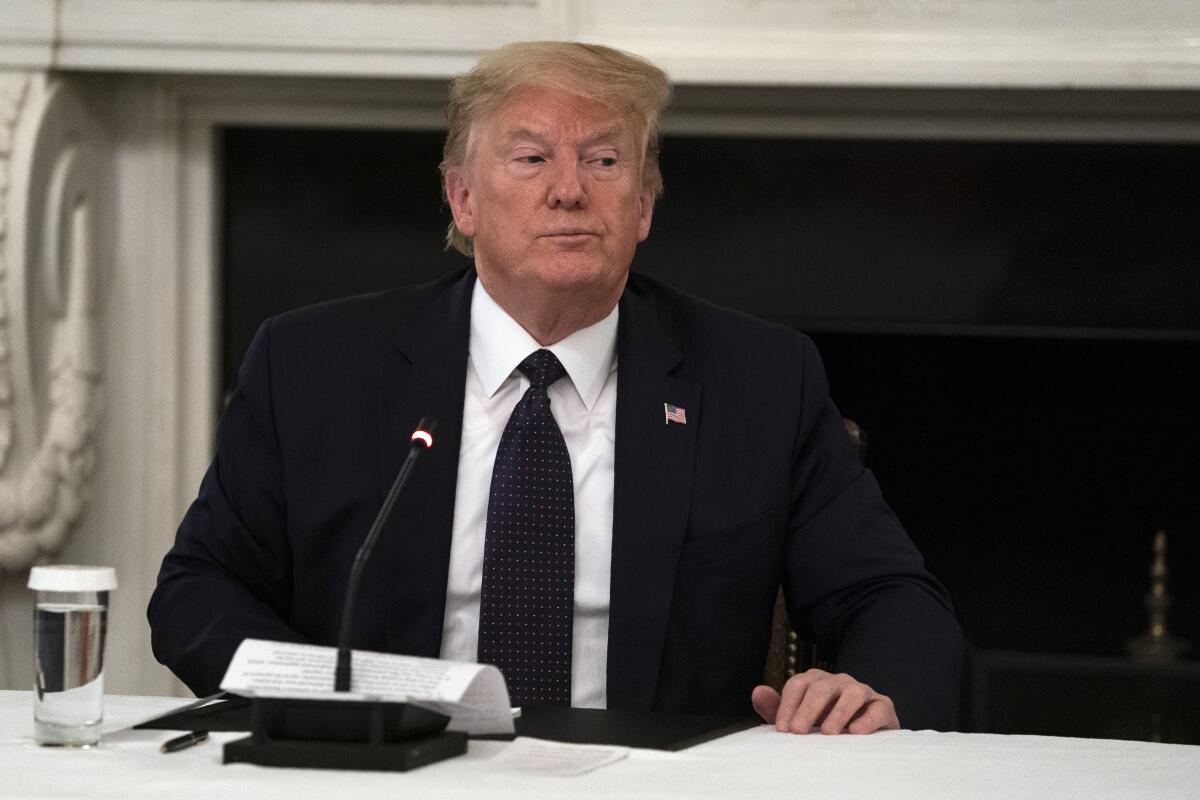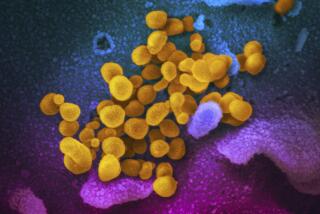Trump threatens to exit WHO, leaving China to lead the virus fight

U.S. President Donald Trump threatened to withdraw altogether from the World Health Organization, a move that would leave Chinese leader Xi Jinping as the most prominent voice leading the global fight against the pandemic.
In a four-page letter detailing his grievances with the WHO, Trump called on the group to “demonstrate independence from China,” renewing a complaint that led him in April to temporarily suspend U.S. funding. He posted the letter on Twitter late Monday.
“If the World Health Organization does not commit to major substantive improvements within the next 30 days, I will make my temporary freeze of United States funding to the World Health Organization permanent and reconsider our membership in the organization,” Trump wrote to Director General Tedros Adhanom Ghebreyesus.
In his tweet, Trump called the letter “self-explanatory.” Still, he gave no other details about the reforms he was seeking or what specific changes might unlock funding.
Trump made the letter public hours after Xi addressed the Geneva-based group’s governing body, the World Health Assembly, by video link. Xi promised to devote $2 billion toward fighting the pandemic over the next two years while urging greater international cooperation to defeat the virus, which has infected 4.8 million people worldwide and killed more than 318,000.
On Tuesday, Chinese foreign ministry spokesman Zhao Lijian said Trump’s letter was “full of insinuations” and aimed “to mislead the public and to achieve the purpose of stigmatizing China’s epidemic control efforts while shirking its own responsibility.” He added that WHO member fees were decided by all member states, and the U.S. has an obligation to pay the full amount.
“Arbitrarily cutting funding to an international organization is unilateralist behavior,” Zhao said. “We urge the U.S. to stop passing the buck and deepen international cooperation.”
The WHO has become fully ensconced in a wider U.S.-China fight for global dominance that has touched everything from trade and technology to university students and journalists. And similar to the trade war, Trump’s “America First” policy has made Xi look more like a champion of the international order.
China Gain
“If Trump were to make good on his threat, it would leave the door wide open for China to increase its influence within the WHO even further,” said Hugo Brennan, principal Asia analyst at Verisk Maplecroft. “Greater influence within the WHO would make it easier for Beijing to shape the global narrative around the pandemic and deflect criticism of its own initial missteps.”
The saga was expected to continue Tuesday at the World Health Assembly, the WHO’s governing body. The Day 2 agenda will include a resolution for a review of the global response to the pandemic that is expected to be approved by consensus.
China said it was now supporting the resolution, which initially stemmed from Australia’s call for an independent probe into the origins of the virus. Zhao said the revised resolution calls for a “comprehensive assessment” of the global response overseen by the WHO that differs from “Australia’s earlier proposal of a so-called independent global review.”
“We suggest the Australia side to go through the text carefully,” Zhao said. “If Australia is willing to change its course and give up the political manipulation of the pandemic, we will welcome that.”
China was considering targeting more Australian exports including wine and dairy, Bloomberg News reported on Tuesday, in what would be a dramatic deterioration in ties. China has already barred meat imports from four Australian slaughterhouses for “technical” reasons, and slapped tariffs of more than 80% on Australian barley late Monday after a long-running inquiry.
In his letter, Trump repeated calls for “an impartial, independent and comprehensive review” of how the WHO handled the crisis. Last month, he said he would temporarily suspend U.S. funding to the WHO, accusing the group of being too supportive of China.
“If you don’t give money, if you quit this organization, then you have zero influence,” said Shen Dingli, a foreign policy scholar based in Shanghai. “America would hurt itself and hurt the entire world. I don’t think China would want to see America quit.”
Administration officials indicated at the time the freeze would last 60 days pending a review. But Trump wrote in his letter that the review “confirmed many of the serious concerns I raised.”
Fierce Internal Debate
It listed several examples of what he said were the WHO’s inaccurate statements about the virus and its praise of the Chinese government’s response.
The president said the United Nations agency “consistently ignored credible reports” of an outbreak in Wuhan, China, last December, then “belatedly” declared it a public health emergency in late January. He said the organization was “inexplicably against” his decision to curb travel from China at the time, even though it “strongly praised China’s strict domestic travel restrictions.”
Trump’s decision to halt financial support to the WHO in the midst of a global pandemic is unprecedented, and it set off a fierce internal debate within his own administration over the extent of the funding freeze.
Some Trump administration officials have argued that the WHO should receive far less than the $400 million to $500 million it gets each year from the U.S., believing the money should go to other organizations focused on public health.
But others have suggested that the funding suspension be used as leverage to force the WHO to adopt changes to what the administration sees as its pro-China bias. Those officials caution that a permanent, broad-based cut could harm efforts to fight the virus, as well as diseases like HIV, polio and the measles.
It’s not clear how much reform the WHO can actually carry out on its own. As with almost every organization under the UN umbrella, such changes would require approval from the countries that belong to the agency, which include China and many developing countries that rely on the agency for crucial medical assistance.
Trump’s critics have accused him of targeting the WHO and China in order to deflect attention from his administration’s handling of the virus crisis. He consistently praised China’s handling of the virus in January and February, even after he was told by the intelligence community on Jan. 28 Beijing was withholding key data about the virus.
“Just had a long and very good conversation by phone with President Xi of China. He is strong, sharp and powerfully focused on leading the counterattack on the Coronavirus,” Trump tweeted on Feb. 7.
Trump’s decision marked a last-minute success by hardliners within his administration to keep denying funding to the WHO. As of Friday night, internal advocates for the group believed they had reached a compromise in which the U.S. would commit to restore some funding -- equal the amount China pays each year.
That left open the possibility of even more money for the WHO because the promised money only covered the annual dues the U.S. is assessed and not the hundreds of millions of dollars more it makes in voluntary contributions every year.
Trump reversed himself after an earlier draft of his letter was leaked to Fox News, and Tucker Carlson and Lou Dobbs went on air to criticize the compromise plan.
“Lou, this is just one of numerous concepts being considered under which we would pay 10% of what we have been paying over many years, matching much lower China payments,” Trump wrote in a tweet Saturday, after the draft was leaked. “Have not made final decision. All funds are frozen. Thanks!”
More to Read
Get the L.A. Times Politics newsletter
Deeply reported insights into legislation, politics and policy from Sacramento, Washington and beyond. In your inbox three times per week.
You may occasionally receive promotional content from the Los Angeles Times.










